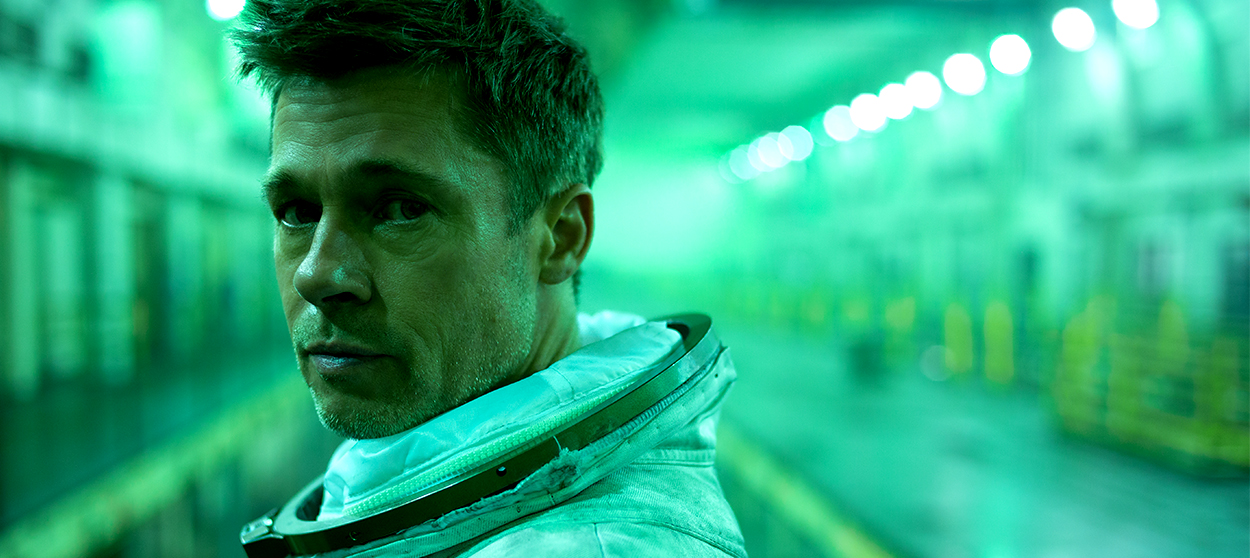What Ad Astra reveals about Brad Pitt's relationship with his dad
There may be more to this film than meets the eye


A free daily email with the biggest news stories of the day – and the best features from TheWeek.com
You are now subscribed
Your newsletter sign-up was successful
Movies rarely get to choose their moments. Brad Pitt's new film, Ad Astra, is no different. But the timing of the space-borne sci-fi picture, out Friday, is auspiciously close to the publication of a recent New York Times interview in which Pitt reflects on his upbringing and makes a profound, revealing statement about the driving influence that's shaped his entire filmography:
"I grew up with that be-capable, be-strong, don't-show-weakness thing," Pitt told me. He was raised in Springfield, Mo., the eldest of three children, his father the owner of a trucking company. Now, at 55, he's reached a point where he sees his dad in every performance he gives. "In some ways, I'm copying him," Pitt said. "He had grown up in extreme hardship and poverty, always dead set on giving me a better life than he had — and he did it. But he came from that stoic ilk." [The New York Times]
It's impossible not to draw parallels between Pitt's storyline in Ad Astra, directed by James Gray, and his words in the Times. In Ad Astra, Pitt stars as Roy McBride, an impassive astronaut sent on a mission beyond the stars to find his missing father. It's a literal search for dad in contrast with the figurative search that Pitt, by his own admission, has been on his whole career.
The stoicism Pitt references to the Times thrums through Ad Astra from start to finish. Roy is cool, unshakeable, and emotionally unavailable. He is enlisted by Space Command to save mankind from chaotic energy surges originating from Neptune. It so happens that Neptune is the last known location of Cliff McBridge (Tommy Lee Jones), Roy's sire, a Space Command legend, long thought dead but now quite possibly alive — and also responsible for wreaking planetary havoc. Roy makes for the moon and then Mars in the hope of contacting Cliff and persuading him to stop the destruction.
The Week
Escape your echo chamber. Get the facts behind the news, plus analysis from multiple perspectives.

Sign up for The Week's Free Newsletters
From our morning news briefing to a weekly Good News Newsletter, get the best of The Week delivered directly to your inbox.
From our morning news briefing to a weekly Good News Newsletter, get the best of The Week delivered directly to your inbox.
Roy's not much of a talker. A majority of Pitt's dialogue is performed through voiceover; he keeps all of his thoughts — his drives, his philosophies, his regrets, his deep spiritual hurt — to himself, never expressing them aloud. He's a prototypical American man, tough exterior, fractured interior, unflappable as they come but burdened by weakness he determinedly avoids acknowledging. In Ad Astra's opening sequence, a freak accident sends him plummeting from the top of a space antenna all the way to Earth, surviving thanks to steel composure (and, more importantly, his parachute). Most would panic when falling from heaven. Roy stays unfailingly cool.
But when faced with complexities of the heart, he struggles, favoring "the essential to the exclusion of all else" as a personal and professional mantra. "All else" includes his estranged wife, Eve (Liv Tyler), less of a presence and more an echo in the film. She maintains a lingering hold over him nonetheless, and so Ad Astra becomes Roy's journey to a gentle, compassionate selfhood through reconciliation with the knottier feelings he has for Cliff. Roy is the "stoic ilk" Pitt references in the Times — strong but silent, a provider rather than a nurturer — and thus may well be the closest version of his own father (at least as described in the interview) that he's played in his career to date.
Roy's sense of duty and loyalty to Space Command comes at the expense of his life with Eve, behavior that, as Gray shows in flashback, he learned as a child and repeats as an adult; as the film progresses, however, he evolves, shedding that stoic manhood and making himself vulnerable. In the Times article, Pitt didn't elaborate on the specifics of his father's quality — maybe he's a kinder, sweeter, and more present man than either the patriarchal stereotype invoked by Pitt's recollection or by Cliff. But Roy may also be the idealized version of what Pitt's father was: the man who could be capable of change.
Where else might Pitt Sr. manifest in Pitt's oeuvre? In Steven Soderbergh's Ocean's 11 films, where Pitt plays roguish thief Rusty, a man seemingly unwilling to settle down? In 12 Years a Slave, appearing as Samuel Bass, a merciful savior to a free man enslaved? In The Curious Case of Benjamin Button, Seven, Interview with the Vampire, or Snatch?
A free daily email with the biggest news stories of the day – and the best features from TheWeek.com
Pitt's varied taste in projects paints a broad portrait of his father's character. Ad Astra, his 59th screen role, frames that portrait with an accidental honesty. If Roy must travel to the fringes of our solar system to rid himself of his inherited toxic masculinity, so be it; and if Pitt must wait over three decades for the part that best expresses his own relationship to his father, all the better.
Want more essential commentary and analysis like this delivered straight to your inbox? Sign up for The Week's "Today's best articles" newsletter here.
Bostonian culture journalist Andy Crump covers the movies, beer, music, and being a dad for way too many outlets, perhaps even yours: Paste Magazine, The Playlist, Mic, The Week, Hop Culture, and Inverse, plus others. You can follow him on Twitter and find his collected writing at his personal blog. He is composed of roughly 65 percent craft beer.
-
 A dreamy long weekend on the Amalfi Coast
A dreamy long weekend on the Amalfi CoastThe Week Recommends History, pasta, scenic views – this sun-drenched stretch of Italy’s southern coast has it all
-
 Can foster care overhaul stop ‘exodus’ of carers?
Can foster care overhaul stop ‘exodus’ of carers?Today’s Big Question Government announces plans to modernise ‘broken’ system and recruit more carers, but fostering remains unevenly paid and highly stressful
-
 6 exquisite homes with vast acreage
6 exquisite homes with vast acreageFeature Featuring an off-the-grid contemporary home in New Mexico and lakefront farmhouse in Massachusetts
-
 Walter Isaacson's 'Elon Musk' can 'scarcely contain its subject'
Walter Isaacson's 'Elon Musk' can 'scarcely contain its subject'The latest biography on the elusive tech mogul is causing a stir among critics
-
 Welcome to the new TheWeek.com!
Welcome to the new TheWeek.com!The Explainer Please allow us to reintroduce ourselves
-
 The Oscars finale was a heartless disaster
The Oscars finale was a heartless disasterThe Explainer A calculated attempt at emotional manipulation goes very wrong
-
 Most awkward awards show ever?
Most awkward awards show ever?The Explainer The best, worst, and most shocking moments from a chaotic Golden Globes
-
 The possible silver lining to the Warner Bros. deal
The possible silver lining to the Warner Bros. dealThe Explainer Could what's terrible for theaters be good for creators?
-
 Jeffrey Wright is the new 'narrator voice'
Jeffrey Wright is the new 'narrator voice'The Explainer Move over, Sam Elliott and Morgan Freeman
-
 This week's literary events are the biggest award shows of 2020
This week's literary events are the biggest award shows of 2020feature So long, Oscar. Hello, Booker.
-
 What She Dies Tomorrow can teach us about our unshakable obsession with mortality
What She Dies Tomorrow can teach us about our unshakable obsession with mortalityThe Explainer This film isn't about the pandemic. But it can help viewers confront their fears about death.
